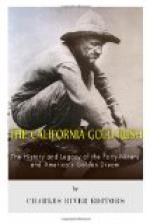CHAPTER IX
THE URBAN FORTY-NINER
In popular estimation the interest and romance of the Forty-niners center in gold and mines. To the close student, however, the true significance of their lives is to be found even more in the city of San Francisco.
At first practically everybody came to California under the excitement of the gold rush and with the intention of having at least one try at the mines. But though gold was to be found in unprecedented abundance, the getting of it was at best extremely hard work. Men fell sick both in body and spirit. They became discouraged. Extravagance of hope often resulted, by reaction, in an equal exaggeration of despair. The prices of everything were very high. The cost of medical attendance was almost prohibitory. Men sometimes made large daily sums in the placers; but necessary expenses reduced their net income to small wages. Ryan gives this account of an interview with a returning miner: “He readily entered into conversation and informed us that he had passed the summer at the mines where the excessive heat during the day, and the dampness of the ground where the gold washing is performed, together with privation and fatigue, had brought on fever and ague which nearly proved fatal to him. He had frequently given an ounce of gold for the visit of a medical man, and on several occasions had paid two and even three ounces for a single dose of medicine. He showed us a pair of shoes, nearly worn out, for which he had paid twenty-four dollars.” Later Ryan says: “Only such men as can endure the hardship and privation incidental to life in the mines are likely to make fortunes by digging for the ore. I am unequal to the task ... I think I could within an hour assemble in this very place from twenty to thirty individuals of my own acquaintance who had all told the same story. They were thoroughly dissatisfied and disgusted with their experiment in the gold country. The truth of the matter is that only traders, speculators, and gamblers make large fortunes.” Only rarely did men of cool enough heads and far enough sight eschew from the very beginning all notion of getting rich quickly in the placers, and deliberately settle down to make their fortunes in other ways.
This conclusion of Ryan’s throws, of course, rather too dark a tone over the picture. The “hardy miner” was a reality, and the life in the placers was, to such as he, profitable and pleasant. However, this point of view had its influence in turning back from the mines a very large proportion of those who first went in. Many of them drifted into mercantile pursuits. Harlan tells us: “During my sojourn in Stockton I mixed freely with the returning and disgusted miners from whom I learned that they were selling their mining implements at ruinously low prices. An idea struck me one day which I immediately acted upon for fear that another might strike in the same place and cause




